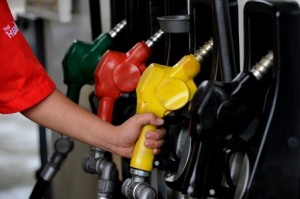Oil firms roll back gas prices Tuesday
MANILA, Philippines — Local oil companies are slashing prices of petroleum products on Tuesday, for the fourth straight week, reflecting the continued downtrend of oil prices in the global market.
Petron Corp., Eastern Petroleum and Seaoil Philippines have decided to cut prices of regular gasoline by 90 centavos a liter, premium gasoline by 70 centavos a liter, diesel by 60 centavos a liter, and of kerosene by 50 centavos a liter, effective Tuesday.
Over the weekend, Flying V Philippines implemented a rollback of 50 centavos a liter for gasoline and 30 centavos a liter for diesel, while Unioil Philippines enforced a 60-centavo a liter rollback for both gasoline and diesel products.
Other oil companies had not issued their respective price adjustments as of Monday afternoon.
Prior to this week’s rollback, diesel products retailed for P44.59 per liter to P48.84 a liter, while gasoline prices ranged from P52.55 a liter to P60.07 a liter. As of May 1, the year-to-date net increase for diesel and gasoline stood at P2.14 and P4.90 a liter, respectively.
Article continues after this advertisementHowever, multisectoral alliance Coalition Against Oil Price Increases said on Monday that the series of rollbacks implemented by oil companies were not enough to offset the alleged overpricing of oil products during previous price hikes.
Article continues after this advertisementCaopi issued the statement as it challenged the Independent Oil Price Review Committee to look into these persistent claims of overpricing. This independent body, which was formed early this year, was tasked to scrutinize the financial statements of the oil companies and study allegations of overpricing, profiteering and collusion.
Similarly, Bayan Muna partylist Rep. Teddy Casiño also called on this independent committee, on Monday, to look into allegations that as of March ths year, diesel has been overpriced by as much as P7.86 a liter and gasoline, by P16.18 a liter.
Casiño also pointed out that since the oil industry was deregulated, the upward movement of local oil prices were quick and often exceeded the movements in global oil prices and foreign exchange. In contrast, the downward movement was slow and often small in proportion to the decrease in the prices of oil in the international prices.
Meanwhile, economist Benjamin Diokno, who heads the Independent Oil Price Review Committee, said in separate briefing on Monday that the group has been employing three methods to determine fair pricing for the local downstream industry, look into the rate of returns of the oil companies as well as look into allegations of profiteering and collusion.
According to Diokno, the group is set to meet with the oil companies individually starting next week to discuss preliminary results.
Diokno, however declined to disclose these preliminary results, citing a confidentiality clause, wherein only the Department of Energy (DOE) would be allowed to make the final announcements to the public. He added that the team has already completed 60-70 percent of its tasks, which would allow it to submit the final results and recommendations to the DOE by July this year.
Diokno again reiterated that the independent oil review committee would only draft the recommendations based on its findings. It does not have the authority to file a case against any erring oil company as this will already be the task of the joint DOE-DEpartment of Justice task force.
The creation of the IOPRC stemmed from the call made by the six oil companies belonging to the Philippine Institute of Petroleum (PIP) in October 2011.
The six-month review process was aimed at scrutinizing the financial statements of the oil companies, in their bid to clear their names over allegations of overpricing and collusion. Members of the PIP, whose books are being subjected to scrutiny, included Chevron (Philippines) Inc., Liquigaz Philippines Corp., Petron Corp., PTT Philippines Corp., Pilipinas Shell Petroleum Corp., and Total (Philippines) Corp.
PIP was in the belief that the additional review to be commissioned would validate previous findings, which disproved allegations of overpricing and collusion hurled against them.
